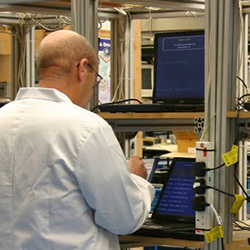 The Basel Convention Conference of the Parties (COP) held in Geneva in May 2015 adopted, on an interim basis, technical guidelines on transboundary movements of electrical and electronic waste and used electrical and electronic equipment. These guidelines mainly describe the distinction between waste and non-waste under the Basel Convention (e-waste technical guidelines). The purpose of the guidelines are to provide guidance to national authorities (environmental and customs) on how to distinguish whether used and end-of-life electronics are hazardous under the Basel Convention.
The Basel Convention Conference of the Parties (COP) held in Geneva in May 2015 adopted, on an interim basis, technical guidelines on transboundary movements of electrical and electronic waste and used electrical and electronic equipment. These guidelines mainly describe the distinction between waste and non-waste under the Basel Convention (e-waste technical guidelines). The purpose of the guidelines are to provide guidance to national authorities (environmental and customs) on how to distinguish whether used and end-of-life electronics are hazardous under the Basel Convention.
These technical guidelines were developed pursuant to a mandate by Basel COP 9 in June 2008. A first draft was completed in September 2010. This was followed by a number of subsequent drafts and many negotiations conducted intersessionally by a stakeholder expert group and during subsequent Open-Ended Working Groups (OEWGs) and COPs. Sims is a participant in the intersessional expert group.
Although significant progress has been made on the document there has been considerable stakeholder debate over the drafting of paragraph 26b. This is relative to the status of non-functional equipment (waste versus non-waste) under the Basel Convention. In simple terms, one side of the debate does not believe used equipment going for repair or refurbishment is waste and therefore should not be controlled by the Basel Convention. Whereas the other side of the debate believes used equipment going for repair or refurbishment is hazardous waste under the Basel Convention and hence should be controlled as such by the Convention. It appears that all agree the guidelines should seek to foster environmentally-sound and legitimate shipments of used equipment for repair and refurbishment and many are amenable to some tailored Basel controls to promote this.
Much advancement was made during COP12, however, there was not enough consensus on provisions related to used equipment going for repair or refurbishment, to enable the COP to fully adopt the guidelines. Therefore, the guidelines were adopted temporarily on an “interim” basis with a commitment to conduct further work on revised guidelines for full adoption at Basel COP13 in 2017.
In particular, it was agreed that additional work will be conducted on the following issues:
- Residual lifetime and age of used equipment,
- Management of hazardous wastes from failure analysis, repair and refurbishment operations in developing countries,
- Obsolete technologies, including cathode ray tubes, and
- Presence of hazardous components in used equipment.